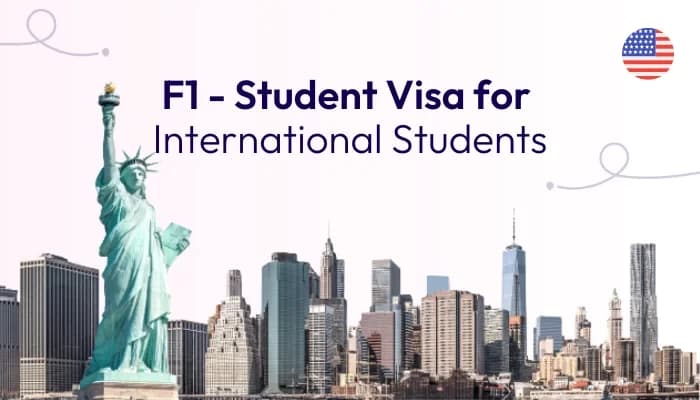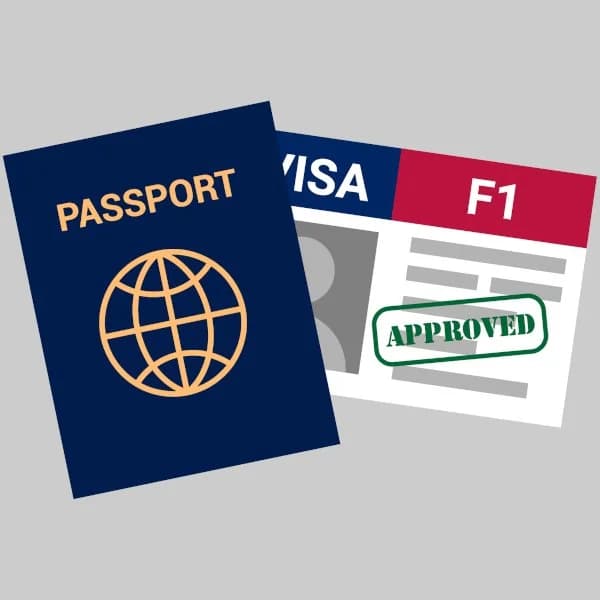F1 Visa: How will you manage cultural difference in the US?

Key Highlights
- Research cultural differences between your home country and the US to show preparedness.
- Be open-minded and willing to embrace new experiences, like participating in American traditions.
- Highlight your communication skills, especially in overcoming language or cultural barriers.
- Be proactive in adapting to a new culture by joining clubs or seeking advice from others.
- Show readiness to integrate into the community and learn from cultural events or peers.
The F1 visa interview can be challenging, especially when you’re asked about handling cultural differences in the US. This article will guide you through answering this interview question with confidence and finesse. We’ll break it down step by step, ensuring you’re well-prepared to impress the US visa officer. Along the way, we’ll provide sample answers tailored for students from Nepal, India, and Ghana, so you can see how these strategies apply to different cultural backgrounds. So, grab a cup of coffee, sit back, and let’s dive into this journey together.
Step 1: Research and Acknowledge the Differences
Start by showing that you’ve done your homework. Research the cultural differences between your home country and the US. This not only demonstrates your preparedness but also shows that you’re genuinely interested in adapting to a new culture. Understanding these differences will help you anticipate challenges and find ways to overcome them.
Example: “In my home country, we have a more collective society where community and family ties are very strong. I understand that in the US, individualism is highly valued, which means people are more independent and self-reliant. I’m looking forward to embracing this cultural shift by learning to balance my individual goals with community involvement.”
Step 2: Highlight Your Open-mindedness and Flexibility
The next step is to highlight your open-mindedness and flexibility. Show that you’re willing to step out of your comfort zone and try new things. Being open-minded means you’re ready to embrace new experiences and learn from them, which is crucial for adapting to a new culture.
Example: “I’m always eager to try new experiences and learn from them. For instance, I’m excited to participate in American traditions like Thanksgiving and Halloween, which are not celebrated in my home country. This will not only help me understand the culture better but also build meaningful connections with my peers.”
Step 3: Emphasize Your Communication Skills
Effective communication is key to managing cultural differences. Emphasize your ability to communicate clearly and respectfully with people from diverse backgrounds. This shows that you’re capable of building relationships and resolving misunderstandings in a multicultural environment.
Example: “I’ve always believed in the importance of clear and respectful communication. I understand that miscommunications can happen due to cultural differences, so I’m committed to being patient and asking questions when I’m unsure. For instance, if I don’t understand a slang term or cultural reference, I’ll politely ask for clarification to ensure smooth communication.”
Step 4: Share Your Past Experiences with Cultural Differences
Sharing past experiences where you’ve successfully navigated cultural differences can be very compelling. This not only shows that you’re capable of adapting but also provides concrete evidence of your skills. Think of any international trips, interactions with people from different backgrounds, or participation in multicultural events.
Example: “During a student exchange program in Japan, I learned a lot about adapting to a different culture. Initially, the language barrier and social etiquette were challenging, but I made a conscious effort to learn basic Japanese phrases and understand their customs. This experience taught me the importance of patience and respect in bridging cultural gaps.”
Step 5: Demonstrate Your Enthusiasm for Cultural Exchange
Show that you’re not just willing to adapt but also excited about the opportunity for cultural exchange. This positive attitude can make a great impression on the interviewer. Explain how you plan to share your culture with others and learn from them in return.
Example: “I’m thrilled about the opportunity to share my culture with my classmates and learn about theirs. I plan to participate in cultural events and festivals, such as international student fairs, where I can showcase traditional food, clothing, and music from my home country. This will not only enrich my cultural experience but also foster mutual understanding and respect.”
Step 6: Highlight Your Support System
Mentioning that you have a support system in place can reassure the interviewer that you’re well-prepared for the cultural transition. This could include friends, family, or mentors who can offer guidance and support as you navigate your new environment.
Example: “I have a cousin who has been studying in the US for a few years now, and he’s been a great source of advice and support. He’s shared valuable insights about American culture and the academic system, which has helped me feel more confident about my transition.”
Sample Answer for a Student from Nepal
“In Nepal, we have a close-knit society where community and family play a significant role in daily life. I understand that the US values individualism and independence. To manage this cultural difference, I plan to engage in community activities, such as joining student clubs and volunteering, which will help me make new friends and feel connected. I also have a cousin studying in the US who has provided me with valuable advice on adapting to American culture, such as understanding the casual communication style and being proactive in social interactions. This support network will help me navigate any cultural challenges smoothly.”
Reasoning: This answer is effective because it shows the student’s awareness of cultural differences, their proactive approach to engaging with the new culture, and their existing support system. Mentioning specific actions like joining student clubs and volunteering demonstrates their willingness to integrate into the community, while the reference to family support provides reassurance that they have guidance.
Sample Answer for a Student from India
“In India, respect for elders and a hierarchical structure are deeply ingrained in our culture. I understand that the US has a more egalitarian and informal approach. To bridge this cultural difference, I plan to participate in classroom discussions and group projects to get comfortable with the informal communication style. I’ve also been practicing American customs like addressing professors by their first names, which is different from what I’m used to. Additionally, I have connected with current students at my university through social media who have shared their experiences and tips, making me feel more prepared for this transition.”
Reasoning: This answer is strong because it highlights the student’s understanding of specific cultural differences and their proactive measures to adapt. By mentioning classroom participation and informal communication, the student shows readiness to embrace the American education system. The use of social media to connect with current students indicates initiative and resourcefulness.
Sample Answer for a Student from Ghana
“In Ghana, we emphasize strong family bonds and communal living, which can be quite different from the individualistic culture in the US. To manage this cultural difference, I plan to immerse myself in campus life by joining multicultural student organizations and attending cultural exchange events. This will help me meet people from diverse backgrounds and learn more about American culture. I’ve also read extensively about American customs and norms, such as the importance of punctuality and direct communication, to ensure I adapt smoothly. Having friends who have studied in the US has also given me practical tips on adjusting to life there.”
Reasoning: This answer is effective because it demonstrates the student’s thorough preparation and willingness to immerse themselves in the new culture. Joining multicultural organizations and attending events show proactive efforts to engage with different cultures. Mentioning research on American customs and practical tips from friends adds depth to their readiness to adapt.
Conclusion: Bringing It All Together
By following these steps, you’ll be able to answer the F1 visa interview question about managing cultural differences in the US with confidence and clarity. Remember, the key is to show that you’re prepared, open-minded, and enthusiastic about the cultural exchange. Your genuine interest in adapting to a new environment will shine through, leaving a positive impression on the interviewer.
What strategies have you found effective in preparing for your F1 visa interview? Share your thoughts and experiences in the comments below!
Have Questions About This Topic?
Join our community to get personalized advice and share experiences with others going through similar visa processes.





